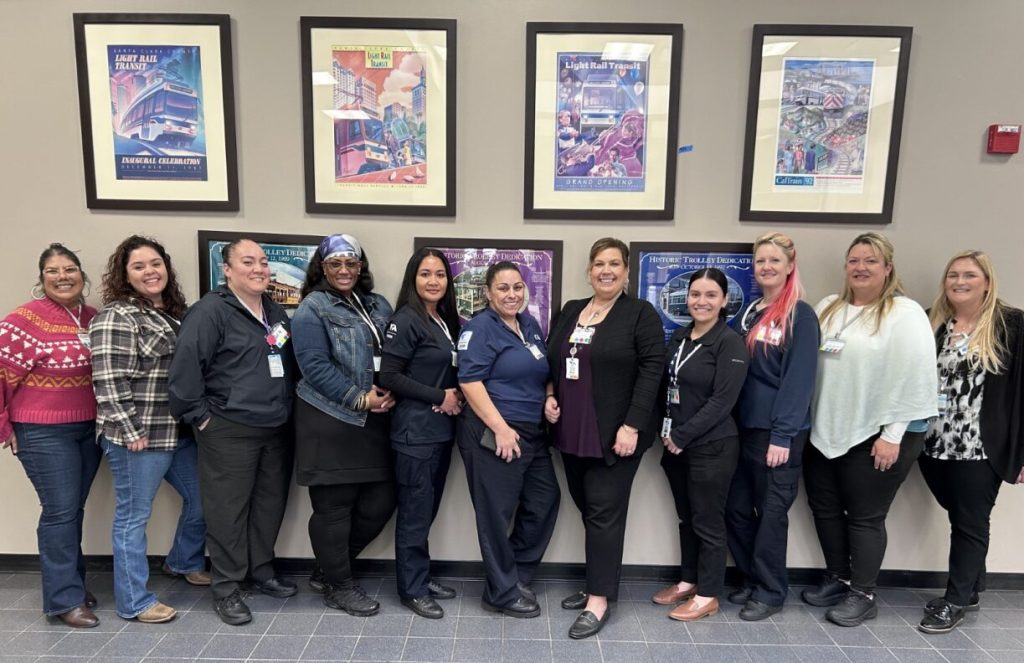VTA’s Female Front-Line Workers Unite for Support and Empowerment
3/28/2024

Identifying and addressing the unique challenges women face in public transit, particularly in frontline roles, is the mission of a newly formed group at the Santa Clara Valley Transportation Authority (VTA), San Jose, CA, known as Women Innovating Transit, or “WIT,” for short.
Shannon Arms, a name synonymous with resilience and innovation at VTA, is approaching her 28th year at the agency by spearheading the group based on her experience as someone who worked her way up the transit career ladder.
Shannon’s journey with VTA began as a bus driver for 17 years, an experience she describes as both challenging and rewarding. Navigating the complexities of being a single mother to two young children, Shannon’s days were a testament to her unwavering commitment to her family and her job.
From standing in foodbank lines on her split shifts to ensure her children were taken care of until the next payday, to driving the bus routes she once relied on as a passenger, Shannon’s narrative is one of grit and perseverance. Her climb up the career ladder from bus driver to a superintendent overseeing VTA’s Cerone Division is a story of triumph against the odds.
With a small number of inspiring women as her role models over the years, Shannon shattered the proverbial glass ceiling. These role models helped her realize the limitless possibilities in her career and motivated her commitment to fostering diversity, equity, and inclusion within the agency.
The Genesis of WIT
Shannon spearheaded the creation of WIT by identifying and addressing women’s unique challenges in public transit, particularly in frontline roles. The group emerged from a necessity recognized by the VTA/ATU Local 265 Joint Safety Committee to address driver assaults and recruitment and retention challenges of women in bus and light rail operations. WIT, a first-of-its-kind initiative at VTA, was brought to life with a core team of ten women, all with former or current experience as bus or light rail drivers.
WIT’s Mission and Initiatives
The mission of WIT is to empower and support women in the public transportation environment, advocating for safety, inclusivity, and education. The group holds monthly meetings and has already made significant strides in its first six months, creating, among other things, resource corners for all employees. Initiatives like WIT Resource Cubbies, maternity uniforms, peer-to-peer training, and the WIT Leadership Certificate Program reflect WIT’s commitment to practical, impactful change.
These initiatives stem from ongoing surveys that capture the voices and concerns of women on the front lines. The members of WIT’s “core team” all have one thing in common: they are passionate about supporting their peers and creating positive change. The group is currently working on a plan to expand WIT to the maintenance division.
Chief Operating Officer Derik Calhoun, Chief People Officer Sonya Morrison, and ATU leadership have all been instrumental in supporting and guiding WIT forward. Sonya has recently offered leadership training for the group, and Derik has ensured they will have all the tools and time needed to get their initiative off the ground.
Personal Testimonies: The Impact of WIT
Nichole Gallagher, a coach driver for more than eight years, shares her connection with WIT. Raised by a single mother, Nichole’s story echoes the struggles faced by many women in the workforce. Her ambition for WIT is to empower women, helping them build a secure future for themselves and their families.
Lisa Bradley, another veteran of VTA, with a 24-year tenure, highlights the importance of WIT in transforming a traditionally male-dominated environment. Her experience underscores the need for mentorship and support, emphasizing how WIT can continue the legacy of empowering women in transit.
For WIT members, this is not just an initiative; it’s a movement dedicated to building a culture of empowerment and inclusivity. This collective commitment is key to paving the way for a brighter, more equitable future in public transportation, where every woman feels empowered to achieve her full potential.